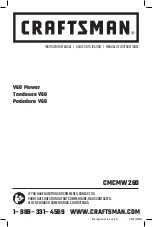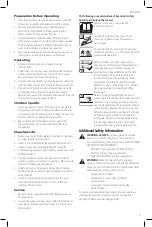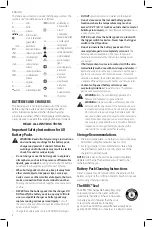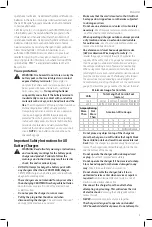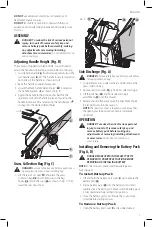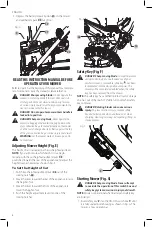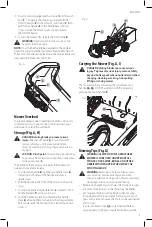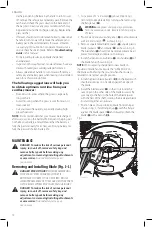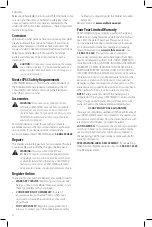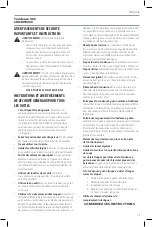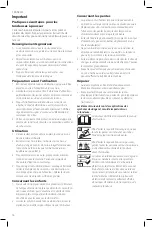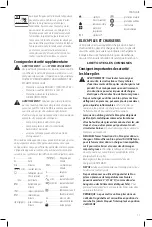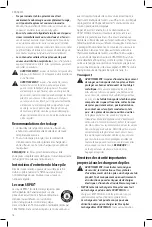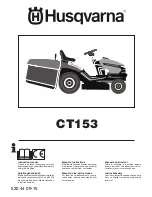
English
3
Preparation Before Operating
1 . Clear the operating area of any objects which could be
thrown by or interfere with operation of the machine.
2 . Keep the area of operation clear of all bystanders,
particularly small children. Stop the machine and
attachment(s) if anyone enters the area.
3 . Do not operate the machine without the entire grass
catcher, discharge chute, or other safety devices in place
and functioning properly. Check frequently for signs of
wear or deterioration and replace as needed.
4 . Wear appropriate personal protective equipment such as
safety glasses, hearing protection, and footwear.
Operating
1 . Only operate the machine in daylight or good
artificial light.
2 . Avoid holes, ruts, bumps, rocks, or other hidden hazards.
Uneven terrain could overturn the machine, or cause
operator to lose their balance or footing.
3 . Do not put hands or feet near rotating parts or under the
machine. Keep clear of the discharge opening at all times.
4 . Do not direct discharge material toward anyone. Avoid
discharging material against a wall or obstruction.
Material may ricochet back toward the operator. Stop the
blade(s) when crossing gravel surfaces.
Children Specific
1 . Tragic accidents can occur if the operator is not alert to
the presence of children. Children are often attracted to
the machine and the mowing activity. Never assume that
children will remain where you last saw them.
2 . Keep children out of the operating area and under
the watchful care of a responsible adult other than
the operator.
Slope Specific
1 . Slopes are a major factor related to accidents. Operation
on slopes requires extra caution.
2 . Travel in the manufacturer recommended direction on
slopes. Use caution while operating near dropoffs.
3 . Avoid mowing wet grass. (Poor footing could cause a slip
and fall accident.)
4 . Do not operate machine under any condition where
traction, steering, or stability is in question. Mower could
slide even if the wheels are stopped.
5 . Avoid starting and stopping on slopes. Avoid making
sudden changes in speed or direction. Make turns slowly
and gradually.
6 . Use extra care while operating machine with a grass
catcher or other attachment(s). They can affect the
stability of the machine.
Service
1 . Keep machine in good working order. Replace worn or
damaged parts.
2 . Use caution when servicing blades. Wrap the blade(s) or
wear gloves. Replace damaged blades. Do not repair or
alter blade(s).
The following are explanations of important safety
hazard pictorials on the mower.
User must read and understand the
instruction manual.
To avoid the risk of serious injury do not
mow up and down slopes. Always mow
across slopes.
To avoid the risk of injury to bystanders keep
all persons and pets at a safe distance from the
mower while operating.
Rotating blades can cause serious injury.
Keep hands and feet clear of mower deck and
discharge opening at all times. Always be
sure blade has stopped. Release bail handle
to turn mower off and wait for the blade
to stop rotating (approximately 3 seconds)
and remove the safety key and battey pack
before removing and replacing grass catcher,
cleaning, servicing, transporting or lifting
the mower.
Objects struck by mower blade can cause
serious injury. Stay behind the handle when the
motor is running. Always ensure persons and
pets are clear of the discharge from the mower
while operating. Always inspect mowing area
before mowing and remove objects that could
be thrown by blade. Release bail handle to
turn mower off and wait for the blade to stop
rotating (approximately 3 seconds) before
crossing walk, roads, patio and gravel drives.
Additional Safety Information
WARNING: ALWAYS
use safety glasses. Everyday
eyeglasses are NOT safety glasses. Also use face or
dust mask if cutting operation is dusty. ALWAYS WEAR
CERTIFIED SAFETY EQUIPMENT:
• ANSI Z87.1 eye protection (CAN/CSA Z94.3),
• ANSI S12.6 (S3.19) hearing protection,
• NIOSH/OSHA/MSHA respiratory protection.
WARNING:
Some dust created by this product
contains chemicals known to the State of California to
cause cancer, birth defects or other reproductive harm.
Some examples of these chemicals are:
• compounds in fertilizers
• compounds in insecticides, herbicides
and pesticides
• arsenic and chromium from chemically
treated lumber
To reduce your exposure to these chemicals, wear approved
safety equipment such as dust masks that are specially
designed to filter out microscopic particles.

